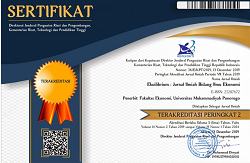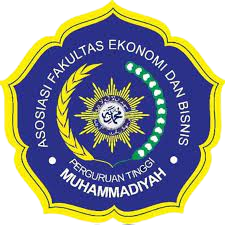Institutional Analysis of Shadow Economy (Study on ASEAN 7 Developing Countries)
DOI: 10.24269/ekuilibrium.v15i1.2020.pp55-69
Abstract
This study aims to analyze the institutional variables of governance in ASEAN 7 developing countries. The independent variables consist of Voice and Accountability, Political Stability and Absence of Violence, Government Effectiveness, Regulatory Quality, Rule of Law and Control of Corruption, while shadow economy is dependent variable. The data used in this study are quantitative data and secondary data by using program Stata 14, the analysis technique used is multiple linear regression panel data. The results show that Voice and accountability has a negative and significant effect on the shadow economy as well as Political stability, Government effectiveness and Control of corruption on the other side. Regulatory quality has a positive and significant effect on the amount of shadow economy. Meanwhile, Rule of law no significant effect on the shadow economy. Underlying the results, the study arranges some policy to reduce negative effect of shadow economy.
Keywords
References
- Arsyad, Lincolin, 2010, Ekonomi Pembangunan Edisi 5, UPP STIM YKPN, Yogyakarta.
- Bayar, Yilmaz.,danOztruck, O.F., 2016, “Finanacial Development and shadow economy in European Union Transition Economies”, Managing Global Transition, 14 (2), 157-173.
- Capasso, S., dan Jappeli, T, 2013, “Financial Development and the Underground Economy”, Journal of Development Economics, No. 101.
- Challen, Ray, 2000, Institutions, Transaction, cost and Enviromental Policy, Edward Elgar Publishing, Northampton.
- Dreher, Axel, Christos Kotsogiannis, dan Steve McCorriston, 2008, “How do Institutions Affect Corruption and the Shadow Economy?”, International Tax Public Finance 773-796.
- Feige, E, 1979, “How Big is the Irregular Economy?”, Challenge, 5-13.
- Feige, Edgar L., 1990, ”Defining and Estimating Underground and Informal Economies : The New Institutional Economics Approach”, World Development, Vol. 18 No. 7.
- Gujarati, D.N dan Dawn C. Porter, 2012, Dasar-Dasar Ekonometrika Edisi kelima Buku Dua, Salemba Empat, Jakarta.
- Johnson, S., Kaufmann, D., &Shleifer, A., 1997, “The Unofficial Economy in Transition”, Brookings Papers on Economic Activity, 2, 159–221.
- Johnson, Simon; Kaufmann, Daniel and Pablo Zoido-Lobatón., 1998, “Regulatory Discretion and the Unofficial Economy”, The American Economic Review, 88/ 2, pp. 387-392.
- Kuncoro, Mudrajad, 2011, Metode Kuantitatif, STIE YKPN, Yogyakarta.
- Mankiw, N. G., 2006, Makro Ekonomi (6th Ed.) (I. Nurmawan, Terjemahan), Erlangga, Jakarta.
- Maulida, R. H. dan Darwanto, 2018, “Analysis of Institusional Quality Influence on Shadow Economy Development”, Jurnal Ekonomi dan Kebijakan,Vol 11 (1) (2018): 49-61.
- North, D.c., 1990, Institutions, Institutional change and Economic Performance, Cambridge University Press.
- , 1991, “Institusions”, Journal of Economic Persepective. 5 (1): 97-112
- Ridwan, Juniarso & Ahmad SodikSudrajat, 2009, Hukum Administrasi Negara dan Kebijakan Pelayan Publik, Nuansa, Bandung.
- Razmi, MJ, Falahi, MA, & Montazeri, S., 2013, “Institutional Quality and Underground Economy of 51 OIC Member Countries”, Universal Journal of Management and Social Sciences, Vol 3 (2).
- Razmi, MJ, & Jamalmanesh, A., 2014, “How Political Indices Affect the Shadow Economy”, Romanian Economic and Business Review, 9, 45-55.
- Schneider, Friedrich., and D.H. Enste, 2000, “Shadow Economies : Size, Causes and Consequences”, The Journal of Economic Literature Vol. 38, No. 1. pp. 77–114.
- Schneider, Friedrich., and Hametner, Bettina, 2007, “The Shadow Economy in Colombia : Size and Effects on Economic Growth”, Johannes Kepler University Working Paper, No. 0703 (January), Johannes Kepler University, Austria.
- Schneider, Friedrich. Buehn, Andreas. and Montenegro, Claudio E., 2010, ”Shadow Economies All Over the World : New Estimates for 162 Countries from 1999 to 2007”. World Bank Policy Research Working Paper (5536, July), World Bank, Washington.
- Schneider, Friedrich, 2017, “Shadow Economies around the World: New Results for 158 Countries over 1991-2015”. Johannes Kepler University Working Paper No. 1710 (Juli), Johannes Kepler University, Austria.
- Scott, M., 1989, A New View of Economic Growth, OUP, Oxford.
- Singh, A., Jain-Chandra, S., and Mohommad, A., 2012, “Inclusive Growth, Institutions and the Underground Economy”, IMF Working Paper, 47.
- Smith, Philip, 1994, “Assessing the Size of the Underground Economy: The CanadianStatistical Perspectives”, Canadian Economic Oberserver.
- Vo, D. H., & Ly, T. H., 2014, “Measuring the Shadow Economy in the ASEAN Nations: The MIMIC Approach”, International Journal of Economics and Finance, 6, 139-148.
- Widyananda, Herman, 2008, Revitalisasi Peran Internal Auditor Pemerintah untuk Penegakan Good Governanace di Indonesia. BPK-RI, Jakarta.
- World Bank,1992, Governanace and Development”, World Bank, Wasington DC.
- World Economic Forum, 2018, The Global Competitiveness Report 2017-2018. Geneva: World Economic Forum, Retrieved from https://www.weforum.org/.
- Yustika, Ahmad Erani, 2012, Ekonomi Kelembagaan :Paradigma, Teori, dan Kebijakan, Erlangga, Jakarta.
Refbacks
- There are currently no refbacks.

This work is licensed under a Creative Commons Attribution-ShareAlike 4.0 International License.














